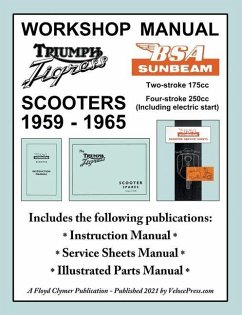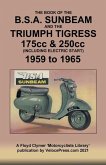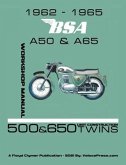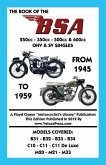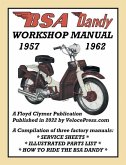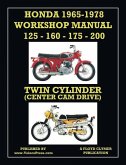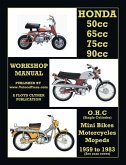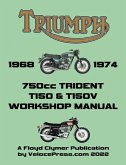190 pages, and more than 120 illustrations and charts, size 8.25x10.75 inches. This manual is a compilation of three factory publications including the owner's instruction manual, the parts/spares manual and a set of service sheets. These publications cover all three variations of the 175cc two-stroke and the 250cc four-stroke and electric start models manufactured from 1959-1965. Neither BSA nor Triumph ever published a workshop manual for these models, however, the combination of these three publications provides the most comprehensive maintenance and repair information that was ever made available from the manufacturer. MANUALS & TECHNICAL PUBLICATIONS: Maintenance, repair and service information was issued under both the BSA and Triumph name. However, as the machines were identical in all aspects, any technical documentation can be applied to either manufacturer without hesitation. SERVICE SHEETS: Beginning in December 1959, both BSA and Triumph began publishing repair, overhaul and technical information in the form of individual (dealer only) 'Service Sheets'. It should be noted that it was never intended that these service sheets would be distributed to the general public. However, they were eventually combined into a single publication and released under both the BSA and Triumph names, the contents being identical in either case. INSTRUCTION MANUAL: Both BSA and Triumph published an identical 'Instruction Manual' the only difference being the name on the front cover. These publications were somewhat more detailed than typical 'owner's manuals' as they included overhaul information in addition to general maintenance and adjustments. As these instruction manuals were included with each new scooter purchased, there were a number of 'editions' published during the lifetime of the model, however, the contents remained basically unchanged. When combined with the 'Service Sheets' they are a reasonable substitute for a workshop manual. PARTS (or) SPARES MANUAL: The parts manuals are also identical and include exploded component diagrams that are extremely helpful in the rebuilding or restoration process. ADDITIONAL DATA: There is an addendum to the rear of this manual that contains a number of communications that were sent from the UK factory to their US distributors. These documents are somewhat rare and they may be of help in assisting in the maintenance of one of these machines. DESIGN & GENERAL SPECIFICATIONS: Designed by Edward Turner (Triumph) and sold under both BSA and Triumph brand names to take advantage of established distribution networks, this badge engineering was one of the last uses of the Sunbeam name. The differences between the BSA Sunbeam and Triumph Tigress were entirely cosmetic-the former in polychromatic green paint, also two-tone red and cream, with a BSA badge; the latter in a shell blue or mimosa and ivory (two-tone) with a Triumph badge. Introduced in late 1959, the scooter was available with a 250 cc four-stroke twin (10hp), or 175cc two-stroke single cylinder engine (7.5hp). Both engines were forced-air-cooled. The two-stroke was a development of the BSA Bantam engine but the four-stroke was a completely new parallel-twin with a gear drive to the gearbox. The contact-breaker fed two separate ignition coils, each of which connected directly to its own spark plug without the need for a distributor. Drive to the rear wheel was by a fully enclosed chain in an oil bath. Both versions had four, foot-operated gears. Some of the 250 twins were fitted with an electric starter and a 12 volt (not 6 volt) electrical system, they were identified as either B2S (Sunbeam) or TW2S (Triumph). The 250 cc four-stroke model was discontinued in 1964 and the 175cc two-stroke model in 1965.
Hinweis: Dieser Artikel kann nur an eine deutsche Lieferadresse ausgeliefert werden.
Hinweis: Dieser Artikel kann nur an eine deutsche Lieferadresse ausgeliefert werden.

